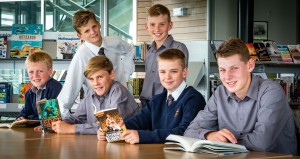How do we make the final year of English at McGlashan unlike anything that has come before?

Our boys refer to the college as ‘The Factory.’ And, now that those blissful Christmas holidays have shuddered to a tragic end, the conveyor belts are again whirling and another batch is being duly produced. They have been lined up and endured yet another beginning of the year assembly; sorted into their given classes, and brace themselves for ... what? More of the same. Everything they’ve been doing in English in Years 7-12, just a little harder? Not likely.
Year 13, at McGlashan, is the first year that English is optional - shock horror, these young men have chosen to be here. They desire to be in our classes. They love language and literature (or perhaps they met the prerequisites and couldn’t bear to sign up for calc or physics.) Nonetheless, they are great young men to work with, at a transformational period of their lives. It’s our belief we must offer them a different experience than they’ve had thus far in English. We must capture their curiosity. And to do this, we start BIG. We ask BIG questions
The first text they will experience at Level Three in English is Rudyard Kipling’s poem ‘If’. I hate it. Basically, it provides a long list of impossibly rare attributes, then finishes with the premise that, If you can possess all of these, ‘Yours is the Earth and everything that’s in it, / And—which is more—you’ll be a Man, my son!’ I don’t tell them I hate it immediately, but they generally catch on when the large animation of a bull doing something bulls are renowned for, superimposes itself on top of the text. The reason this poem irks me so, is that, by the criteria listed, I’m not a man. Nor is anyone I’ve ever met; or am likely to meet henceforth. Nor will any of the young gents in front of me be. And this begs the first big question...
BIG QUESTION NUMBER ONE - What does it mean to be a man at this point in our history? The course we most frequently teach at Year 13 is very male-centric one. Our audience is 17 and 18-year old men - so it figures I suppose, but there is a little more to it than that. David Fincher’s Fightclub’ and Ken Kesey’s One Flew over the Cuckoo’s Nest feature large, and both depict men struggling to find a place and purpose in the worlds in which they walk. Or swagger in the case of Randle P. McMurphy. There’s also a smidgen of Othello and a pitter pattering of unfamiliar texts. So, with masculinity at the forefront of many of these texts, it seems logical to begin by defining masculinity. We trace masculine ideals through the Elizabethan era, leap forwards to a bit of John Wayne in the 50’s, contrast him with the hippy movement, then talk a little about ‘metro-sexuals’ comparing them to the archetypal ‘Southern’ Men from the Speights Ads, then thoroughly cloud the water by discussing All Blacks and eyeliner - thanks, Ma’a.
Each time I ask this question, I’m surprised by the genuine curiosity that it provokes. Once the boys go beyond the stereotypes and begin to consider what makes a man of quality, there is a bit of a buzz. They create lists of manly attributes, debate and discuss their relative merits - how important is it for a man of quality to be a good mate? To have a good sense of humour? To be physically capable? To be a good son? Father? Partner? To be rich? To have integrity? Really, what’s being asked of them is what do they value, and what do they aspire to be like. And of course, their curiosity is prodded a little. So then, it’s time to ask them the biggest of all questions.
The charismatic Tyler Durden of Fight Club fame berates all those who define themselves by what they do. His mantra: ‘You are not your job, you are not the content of your wallet...’ is a great starting point for the next big question - now that you know what being manly is - what do you want to be? This isn’t a big question - because actually, we all have the exact same answer to this. To guess the answer, ask yourself what you want for your children. I want my children to be ... happy? In exploring the real question here - which is not what but HOW to be truly happy, we draw from the work of Martin Seligman. One aspect that really sparked my curiosity when I first read Seligman’s wonderful Flourish was the research on lottery winners, which found that those who win the jackpot have a huge spike in the amount of happiness they feel. No surprises. The interesting thing is what happens a year later. All is as it was. If they were happy and cheerful, happy and cheerful they remain. But if they were a bit of a miserable sod ... well, that’s what they’ll return to. [1] And there have also been studies conducted that show the opposite regarding those who become paralysed. While obviously, their relative levels of happiness dip strongly, after a year or so, they end up about where they were.
Presenting this to the boys, we then discuss that, if being wealthy has a pretty limited effect on your levels of happiness, what does make a difference? And here we watch a little Seligman on TED - look him up - Seligman Flourish - it’s about 23 minutes long and time well spent. Here they’ll learn about Seligman’s view on the five factors of our lives that need to be fulfilled for us to attain happiness. Seligman uses the acronym PERMA (Positive emotion, engagement, relationships, meaning and accomplishment). It’s good stuff, and a pathway to some serious curiosity - can I affect the way these qualities work in my life?
But what’s the point to all this? English is a study of the human condition. I love Noam Chomsky’s view of it “It is quite possible--overwhelmingly probable, one might guess--that we will always learn more about human life and personality from novels than from scientific psychology.” By establishing a context as broad as the fundamental desires of us all, my students are positioned to consider each character they meet from the point of view of PERMA and, accordingly to broaden their own understanding of the literature they will encounter.
And it is this literature that we turn to next – as we consider the next big question. Our students have been with us for five to seven years, during which time they have been exposed to a pretty wide array of literature – increasing in complexity as they progress through the college. The thing is though – they don’t actually know what literature is. Beyond the standard dictionary definition, which reads something like: ‘Books and writings published on a particular subject (Oxford Dictionary), they begin some head scratching and seat shuffling in earnest when asked, ‘What IS literature?’ I play them a Tom Waits “song” Circus, which is really a monologue creating a series of little vignettes capturing ‘carnie’ characters, such as Horseface Ethel and Mighty Tiny on the saw, then ask them if it could be a work of literature. The kind with the capital ‘L’. Again, here, their curiosity grows as they strive to tackle this question, and quickly realise that to categorise, you must understand what defines the category. And thus we discuss what qualities a work might have, and to what degree they might have them, in order for the work to be considered worthy. The secret purpose here is to begin moving them beyond explaining and analysing to responding critically, which those helpful explanatory notes tells us means: ‘...making evaluative interpretations and judgements’. To be able to do this, we MUST be able to make judgements about the quality of the work. Ergo, we must know what makes a work of a high quality.
I mentioned at the start, that I believe we MUST try to make the experience of Level Three something new - something fresh. I really strive to create a climate that is challenging, stimulating - even a bit daunting. This is why I love the Critical Lenses standard that’s our first internal for the year; it epitomises what I think a Level Three course should do. It is unlike anything they’ve experienced before. It is challenging, academic, daunting and superb preparation for those going into tertiary study. I particularly like the ‘Literary Lenses’ task, with its emphasis on the death of the author, and entirely new ways of approaching texts, as opposed to the hegemonic liberal humanist view we so often favour. Exposing Year 13 students to this can be revolutionary. I like to start proceedings by telling them I’ve been lying to them - or their cohort at least - for the last five - seven years, and getting them to guess what about. At this point, they generally become quite curious. You know that one kid - the one who asks but how do you KNOW that the writer/director etc was really trying to do that? This is their moment. In truth we don’t know. Unless the creator of the text explicitly tells us, we’re just guessing. Learned, intelligent guesses based on textual evidence granted. But guesses nonetheless. Then comes the clincher - it’s not just that we’ve been lying to you, we’ve also been hiding something from you. Something HUGE about reading texts. The liberal humanist approach is just ONE way, and there are dozens of other entirely different approaches - many of which consider the author’s intentions irrelevant. A brief sojourn into Sian Evans’ wonderful Through the Literary Looking Glass follows thereafter.
And so it goes. We’re a good way into the term now and this early exploratory thinking is now being weaved into what happens in our lessons. I’m thoroughly happy with the way the boys (and two Columba Girls this year - shock horror!) have responded thus far. Now we’ll see how well they rise to the challenge of producing a piece of critical theory analysis, that’s beyond anything they would have ever considered to be a part of English during Level Two. So far, at least, so good.
―
References
Chomsky, Noam, and Anthony Arnove. The Essential Chomsky. New York: New Press, 2008. Print.
Evans, Sian. Through The Literary Looking-Glass. Lyttelton, N.Z.: NZ Association for the Teaching of English, 2012. Print.
Seligman, Martin E. P. Flourish. London: Nicholas Brealey Pub., 2011. Print.

 Open Event Registration - Interested in enrolling?
Open Event Registration - Interested in enrolling? Employment opportunities - click if you're interested in working at McGlashan.
Employment opportunities - click if you're interested in working at McGlashan.